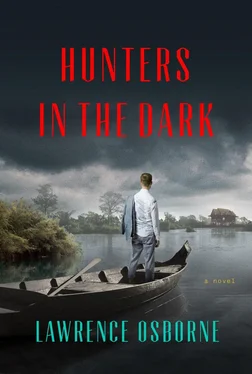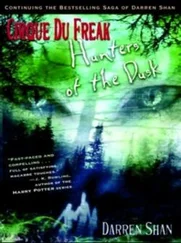“You seem nervous,” she said. “Are you anxious to leave?”
“I am. I don’t know why.”
“You shouldn’t be so anxious. It’s just an escape.”
“Yes, and it was my idea—”
She nudged him and said, “Yes it was, and now we’re stuck with it!”
But somehow it wasn’t entirely his idea. He began to feel foreboding and doubt; when the redoubtable guide appeared at long last, Robert felt an immense relief but also an even greater uncertainty. They got up and they shook his hand and Davuth looked them both rather searchingly in the eye and asked if they had slept well.
—
Davuth himself had risen early and prepared himself meticulously. He had put his rooms in order and left everything spare and neat. He had crammed the bag with the money he had taken from the barang’s car that night into the apartment safe, and when he recounted it now he was surprised to find that he had spent so little of it. He had made himself a coffee in the unit’s kitchen then gone outside to sip it, looking down at Robert’s door. It gave him a feeling of delicate power.
He had become, over the years, remarkably attuned to the fear in others. As he opened the back doors for them now and they got into the car he could smell it on them — and yet it was not a conscious fear, it was more an anxiety that they were being taken somewhere they didn’t know. It was strange, indeed, how human beings liked to be taken places they didn’t know. It was the impulse that lay behind a lot of otherwise inexplicable events. He thought this, at least, as he drove smoothly and quite slowly through the still-sleeping city. The air was like spring in a northern country. As they passed the lovely train station he saw birds rising and then falling from the roofs in wave-like formations. In the public gardens the frangipanis stood stock-still and cool like giant storks, exuding an atmosphere of composure and haughtiness. Farther out, the traffic was beginning and he went more quickly; the dust was quiescent. His two young passengers lay back on the seat and watched the grinding suburbs roll by. It was the same road they had taken to Phnom Chisor that day, the same factories and dusty verges and the fields opening up to vistas of sugar palms. Yet it looked completely different. Great pools in the paddies reflected a cloudless sky.
They passed Ta Phrom and pressed on until they were at the great roadside brick structures known as Prasat Neang Khmau, “Black Lady” in Khmer. Davuth parked under some trees and they got out in the delicious sparkling air and walked over to the two towers. He told them, with an air of confidence, that the name referred to the goddess Kali.
“Tenth century,” he said, smiling and leading them right up to the brick, upon which he laid a hand. “Splendid!”
They walked around the towers while Davuth smoked and watched them with a jovial expression. Like them, he felt the clear and dry air as something fresh and new, perhaps a harbinger of the rainy season’s imminent end. In the secrecy of his own thoughts he had not yet decided anything. He had no plan whatsoever, he had resolved merely to see what happened moment by moment, but this very plan — or nonplan — felt so right, and so inevitable, that he went along with it happily. So he smoked and sat by the dry road and watched the longhorn cattle in the fields glowing cream in the sun and he felt at peace with himself and with everything that was going to happen from now on.
Sophal took some pictures of Robert standing by the towers and they then wandered around the bright modern temple next to them.
“It’s better now,” she murmured. “I feel better. It’s so dry in the sun. I’m glad I came.”
“See?”
“I should have trusted you — Mr. Tourist.”
“You should have. I know best.”
“No, but it’s OK. Sometimes you do.”
It was strange, to her, that the early hours of a day could bring a new magnetic charge. As if a magnet had swept across the earth rearranging secret filings inside all living things. You had to be out in the countryside to feel it. Your senses were aware of it; you felt an almost appalling calm. The moments were pure pleasure, ticking away like the drops of a water clock. It was then that the boy to whom you were drawn came closer, suddenly filling all of your consciousness.
She was swept by a wave of accepting love, though she was not sure if that was what it was. Her father always said that in this traumatized country no one ever loved. He said it was a sentimental country with no love. No empathy, no trust. But she was beginning to disbelieve it. The generations change, she thought as she tasted slightly bitter iron dust on her lips and smelled woody incinerators from distant and invisible fields. The sun’s glare made her quiver and blink and feel wonderfully alive. The generations change and love comes back into a people, even into a people that has been raped. Suddenly, one morning, it happens — the atoms shift, the animal life reasserts itself quietly and by some miracle life goes back to what it was meant to be. It happens inside the heart where no one can see it. The crucible comes alive again and there is a stirring inside the once-cold ashes. It is lovelessness that is short-term and narrow and destined not to endure because it has nowhere to go. If life is a stream, it is the dam made of rubbish and twigs. It cannot last. It breaks, twig by twig, and the movement begins again because it has to. There is nowhere else for it to go. Life moves.
She glanced over at Davuth sitting with his smoke and she saw the tension in his shoulders, the brooding droop of the head. There it was, the old world, the lovelessness. It was pathetic and dry and static and out of that immobility came a quiet hatred that was mysterious even to itself. Was that evil, then, in the Buddhist sense? She had exchanged barely a word with him in their shared language. It was as if he was forcing her to speak English with him. He’s not a real guide, she thought.
They drove on and by midday they were in Takeo. At this time of year it was a riverine town with a quay and boats coming and going across the vast Mekong floodplain. By this seasonal waterfront a row of stalls had been set up alongside the jetties and here the pilots of the longtails sat in the shade waiting for infrequent customers. Behind them spread a desultory, ramshackle town with rows of shophouses and first-floor balconies with plastic columns. There was a messy, chaotic market where the butchers were in full swing. Traffic circles with sad lawns baked in the sun.
They stopped at the quay. They got out and Davuth sauntered down to the pilots. He bargained with them with surly charm. A boat until dusk. So he did not, after all, know a man here with a boat. Unconcerned, Sophal and Robert lay on the wall and sunbathed in the glare of the dirty water that lapped below them. The floodplain looked like a limitless lake, an island sea with no visible farther shore. Its water was smooth and flat, rippled by slow, gentle swells. Here and there the tops of submerged trees popped up, crowned by feathery swarms of white birds. The upper branches were clotted with nests.
This great body of surly, placid liquid created its own dark light, within which the floating beds of water plants and their flowers shone with a muted malevolence. The men who piloted the longtails looked over at the young couple on the wall with a soulful cynicism. City kids, easy money. On the far side of the waters lay the mysterious ancient town of Angkor Borei and the flooded temple mountain of Phnom Da, which, as Davuth had said, could only be reached by boat during the rains. These were the points of interest which the occasional barang visitors invariably wished to see, and once or twice a week each one of them made the eerie trip across the floodplain with a group in straw hats. Robert now gazed out at this featureless prospect and his heart sank a little. It looked like it would be a long and uncomfortable ride, to say the least. He stroked her warm shins and caressed the backs of her ankles and he could see that she was thinking the same thing.
Читать дальше












